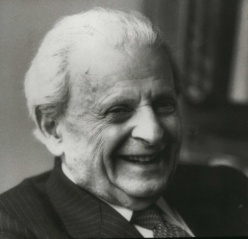
Part of my PhD dissertation is about the philosophy of Emmanuel Levinas (1906-1995). A critical issue in any English language discussion of this philosopher is this: what is the correct possessive to use with the philosopher’s last name? Is it “Levinas’ philosophy” or “Levinas’s philosophy”?
Both occur in the literature. Ask an Anglophone Canadian and they will usually answer that it should be “Levinas’ ”. This attitude can be traced to the Canadian Style Guide which states:
Regarding the appropriate form for singular words that end in a sibilant, pronunciation is again the determining factor. If it would be natural to pronounce an extra s, add ’s; if an additional s would be difficult to pronounce, add only an apostrophe:
- Joyce’s Ulysses
- Ulysses’ wanderings
- Brussels’ bureaucrats
- the boss’s office[1]
However, when one actually reads the literature, the overwhelmingly preferred form “Levinas’s”.[2]It is also used by translators such as Michael B. Smith, Gary D. Mole, Bettina Bergo, Barbara Harshaw, Alan Bass, Annette Aronowiscz, André Orianne, Michael Kigel & Sonja M. Embree, and Nidra Poller. Notably Levinas Studies published by Duquesne University uses “ ’s” as does Alphonso Lingis, translator of both Totality and Infinity and Otherwise than Being. So that should settle it, right?
No. Maddeningly, “Levinas’ ” is used by a minority: Toby Foshay, Richard A. Cohen in Ethics and Infinity, Merold Westphal in Transcendence and Self-Transcendence, Ernst Wolff in Political Responsibility for a Globalised World: After Levinas’ Humanism, the editors of Levinas and the Ancients, Alain Mayama in Emmanuel Levinas’ Conceptual Affinities with Liberation Theology, and Simon Glendinning in In the Name of Phenomenology. So which is correct?
The style guide I am required to use – MHRA (Modern Humanities Research Association) gives the following guidance:
- 5.2 Proper Names The possessive of proper names ending in a pronounced -s or -z isformed in the normal way by adding an apostrophe and s:
Alvarez’s criticism, Berlioz’s symphonies, Cervantes’s works, Dickens’s characters, in Inigo Jones’s day, Keats’s poems, Dylan Thomas’s use of language
French names ending in an unpronounced -s, -x, or -z also follow the normal rule and take an apostrophe and s:
Rabelais’s comedy, Descartes’s works, Malraux’s style, Cherbuliez’s novels
The possessive of names ending in -us also conforms to the normal rule:
Claudius’s successor, Herodotus’s Histories, Jesus’s parables, an empire greater than Darius’s
However, the possessive of Moses and of Greek names ending in -es (particularly those having more than two syllables) is usually formed by means of the apostrophe alone:
under Moses’ leadership, Demosthenes’ speeches, Sophocles’ plays, Xerxes’ campaigns
The Chicago Manual of Style also gives some guidance. “Levinas” ends with an “s” and normally a silent “s” is followed by “ ’s”; thus, one would write “Albert Camus’s novels”. However, the name “Levinas” was not originally a French name, and the “s” is pronounced[3]. Since it is pronounced, the following should apply:
- 18 Possessive of names like “Euripides”
In a departure from earlier practice, Chicago no longer recommends the traditional exception for proper classical names of two or more syllables that end in an eez sound. Such names form the possessive in the usual way (though when these forms are spoken, the additional s is generally not pronounced).
Euripides’s tragedies, the Ganges’s source, Xerxes’s armies[4]
*sigh*
This is a change from an earlier practice is which Biblical and classical names which ended in –s or –x simply had an apostrophe with no “ ’s”. Thus, it is traditionally “Jesus’ ” and not “Jesus’s”. However, as the 16th edition of the Chicago Manual suggests, this is the exception, and is no longer extended to classical names.
The Economist Style Guide[5] states: With singular words and names that end in s: use the normal possessive ending ’s: boss’s, St James’s, caucus’s, Jones’s, Delors’s, Shanks’s
Thus, while it looks ugly, “Levinas’s” will be used in the dissertation, in deference to the majority of authors, scholars, and modern style guides. But I don’t like it.
[1] Canadian Style Guide (Toronto ON: Dundurn Press & Public Works and Government Services Canada, 1997), 7.56.
[2] Namely, by: Adriaan Peperzak, Robert Bernasconi, Edith Wyschgorod, Diane Perpich, Judith Butler, Hilary Putnam, Roger Burggraeve, John Caputo, Seán Hand, Simon Critchley, Merold Westphal, Dermot Moran, Richard E. Cohen, Robert Gibbs, Ze’ev Levy, Robert Eaglestone, Samuel Moyn, Slavoj Žižek, Graham Ward, Nathan Ross, Stephen Hendley, Jane Hiddleston, Jeffrey Bloechl, J. Aaron Simmons, Corey Beals, Tamsin Jones, B.C. Hutchens, Phillip Blond, David Appelbaum, Megan Craig, Ira F. Stone, Michael Morgan, Diane Moira Duncan, Manuel P. Arriga, Jill Robbins, and Peter E. Gordon.
[3] To add to the confusion, it is written in French as both “Levinas” and “Lévinas”
[4] The Chicago Manual of Style 16th edition (Chicago: The University of Chicago, 2010)
[5] p. 114.
